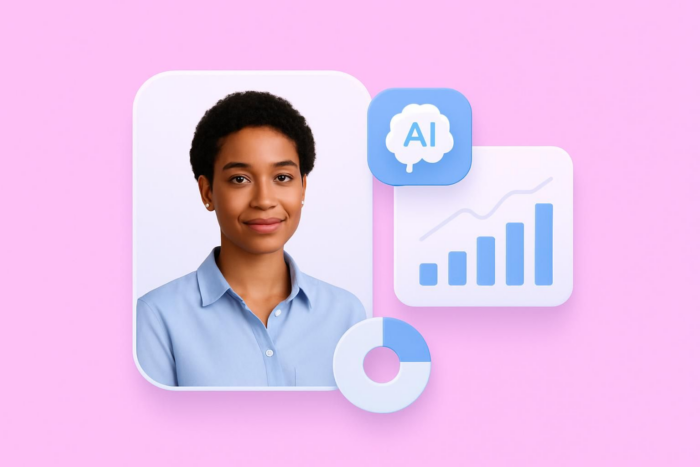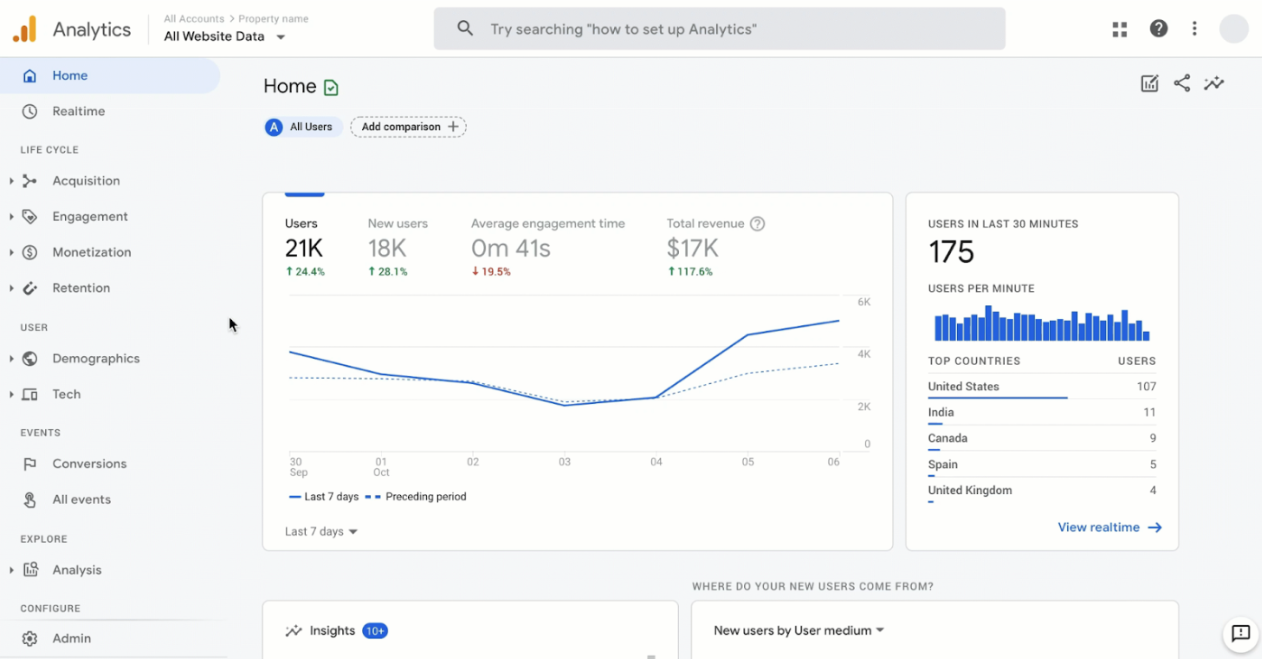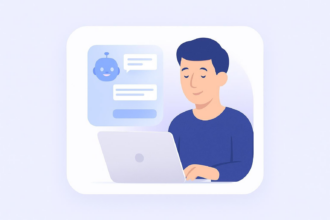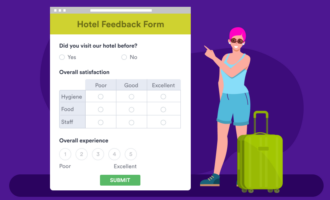Top 5 AI tools for customer analytics
Artificial intelligence (AI) is impacting every facet of business, including how you understand and interact with your customers. AI customer analytics technologies give you timely insights into what your audience needs, what challenges they are facing, and how you can connect with them.
So is AI replacing customer service? No, but it can make you and your team more effective at delivering the services your audience wants. The key is to choose the right AI tools for customer data analytics. This guide outlines why analytics are so important, key use cases for AI, and five top solutions you should explore.
What is AI customer analytics?
AI customer analytics uses artificial intelligence to sift through huge volumes of consumer data and uncover insights into behavior and preferences. It leverages machine learning (ML) algorithms to analyze everything from purchase history to web activity and support requests.
The technology identifies patterns and trends far faster than human analysts. This results in actionable outputs like:
- Churn analysis
- Customer journey analytics
- Customer lifetime value
To provide good customer service, you must uncover what consumers want and need. AI allows you to do that more effectively and efficiently. You can unlock customer insights while they are still relevant and valid.
AI models can aggregate data across the entire customer journey, then apply techniques like predictive analytics and customer segmentation to draw conclusions you can act on. For example, you can use AI to analyze social media posts in real time and gauge how customers feel about a new product or service.
Traditional analytics methods often fall short because of the sheer volume of customer data. As a result, data-driven marketing becomes challenging because you’ll be acting on outdated information. Using AI and ML for customers facilitates more effective personalization based on what your audience actually wants.
Why does AI matter for customer analytics?
Artificial intelligence provides you with the speed, scale, and predictive power that traditional analysis can’t match. You can unlock real-time insights by processing data continuously. This means no more responding to market changes weeks or months later. Instead, you can react when it matters.
AI can also uncover hidden patterns in huge datasets. This superior pattern recognition means you can capitalize on fleeting opportunities.
One of the most valuable reasons to use AI is that it provides better forecasting capabilities. You can accurately anticipate everything from product demand to potential revenue. AI customer analytics is invaluable for reshaping
- Marketing: Use AI to choose the right message and channel for each audience segment.
- Sales: Score leads and recommend products based on a person’s past interactions with your brand.
- Customer support: Resolve support tickets faster by ensuring that they are routed to the right person the first time.
As you can see, there are plenty of benefits to using artificial intelligence for customer-facing activities. However, you’ve got to be cognizant of the disadvantages of AI in customer service. Forcing users to interact with your AI tools can lead to frustration with your brand – because sometimes, customers just want to speak to a person.
Additionally, you’ve got to be transparent about your use of artificial intelligence. Be honest about what data you’re collecting and how you are using it. Give customers a chance to opt out if they prefer.
Use cases of AI in customer analytics
AI-powered analytics tools can support all types of customer service. One major use case involves predicting customer churn. If you rely on subscription-based revenue, use AI models to identify changes in usage patterns and reengage with your audience before they cancel.
For example, if a user’s login frequency drops significantly, AI can alert your customer success team before renewal time.
Another common use case is customer segmentation and personalization. You can group your audience into subclasses based on their history with your brand and where they are in the conversion process. People at different stages of their journey need different types of engagement.
Potential customers who are still in the discovery phase aren’t ready for strong sales tactics. On the other hand, consumers who have been long-time supporters of your brand may be more susceptible to upselling attempts.
AI for customer success is perhaps the best example. Using artificial intelligence to empower your customers and deliver timely, relevant support can drastically reduce churn. More importantly, you can transform your most loyal followers into avid brand advocates who actively tell others about your company. That’s one of the most powerful forms of social proof out there.
The best AI tools for customer analytics
Many AI-powered tools are available to help your business obtain useful customer insights. However, it’s easy to become inundated with choices. To narrow your search, we’ve identified five top AI customer analytics tools, each with unique strengths and use cases.
1. Jotform AI Agents
Jotform provides conversational AI for customer service forms and other customer-facing tasks. Create your own agents using one of Jotform’s hundreds of pre-configured templates. These templates save time and allow you to build a customized AI agent in minutes.
Some examples of agents you can build include a phone agent, a chatbot agent, and a customer service agent. These agents excel at personalized customer interactions and automating support tasks.
Don’t know how to code? You don’t need to, thanks to Jotform’s no-code setup and drag-and-drop customization tools. The platform is accessible to non-developers. Since it ties with Jotform’s form builder, it directly turns the data you collect into actionable conversations and useful insights.
One of the biggest advantages of Jotform is its user-friendliness. It’s easy for your team and your customers to interact with. Choosing an appealing piece of technology promotes widespread adoption and sets you up for a strong return on investment.
With Jotform, you can make customer interactions smoother. It’s particularly useful for form-based exchanges and eliminates missed fields or other mistakes that may prevent you from getting the data you need. They’ve also got templates for virtually any use case you can dream up.
Best for: Organizations that need 24/7 customer service AI assistants
Developer: Jotform
Key features: Multichannel AI agents, hundreds of pre-built AI agent templates, and powerful integration and add-ons
Pros: Provide around-the-clock support for customers, ensure immediate responses, gather data for customer analytics, and ensure an immediate response even outside business hours
Cons: Primarily focused on direct support interactions, requires integration with advanced predictive analytics tools for optimal insights
Plans/pricing: Starter (free), Bronze ($34/month billed annually), Silver ($39/month billed annually), Gold ($99/month billed annually), Enterprise (custom price)
G2 rating: 4.7
2. Zendesk AI
Zendesk AI enhances customer support with chatbots, auto-triage, and AI-generated replies. The bots can handle frequently asked questions, while the agent-assist tool offers suggested responses and article links during live interactions. These tools reduce resolution times and lighten the workload on your agents. It’s a true win-win.
AI features are integrated directly into the Zendesk Support Suite. Your agents can stay in one workspace and eliminate the frustrating back-and-forth that hampers productivity. It works across web, chat, email, and even social. However, you’ll need a higher subscription tier to unlock all of Zendesk’s AI capabilities.
If you aren’t already using Zendesk for customer support, making the transition just for the AI customer analytics tools probably isn’t worth the hassle. However, if your customer service platform also needs an upgrade, making the move can be worthwhile. Just keep in mind that Zendesk doesn’t offer full predictive customer analytics beyond service interactions.
The good news is that those interactions are where loyalty is gained. You can use Zendesk AI to address support-related churn and keep your customers coming back.
Best for: Businesses needing comprehensive customer support with built-in AI
Developer: Zendesk
Key features: Chatbots and AI-powered tools to resolve common questions, ticket deflection/resolution
Pros: User-friendly, strong knowledge base for support, and analytics tools to identify customer needs/trends
Cons: Can be costly, advanced features are only available on higher-tier plans, and is not a standalone analytics tool
Plans/pricing: Suite Team ($55 per agent/month billed annually), Suite Growth ($89 per agent/month billed annually), Suite Professional ($115 per agent/month billed annually), and Suite Enterprise (call for pricing)
G2 rating: 4.3
3. Salesforce Einstein Analytics
Einstein Analytics brings predictive intelligence into Salesforce CRM. It analyzes sales data to score your leads and forecast opportunity outcomes. You can also flag churn risks using customizable parameters. Want to track engagement scores? Einstein can do that, too.
Einstein integrates seamlessly into Salesforce pages. It shows AI predictions within your daily workflow. Business users can build models without coding, and your sales reps get next-step guidance to address leads who’ve gotten stuck in the pipeline. Since it already has access to all of your Salesforce CRM data, the AI platform will have no problem generating actionable insights.;
The downside to Einstein is that it’s not a standalone solution. You’ll need Salesforce to run Einstein. It’s also quite expensive to add on to lower Salesforce subscriptions. Einstein is $125 per user per month when billed annually. The good news is that if you already have a higher Service Cloud edition, AI may come as a standard part of your plan. Review the terms of your plan to find out.
Best for: Businesses already in the Salesforce ecosystem
Developer: Salesforce
Key features: CRM analytics (formerly Tableau CRM), BI dashboards, AI-generated explanations
Pros: Deep integrations with Salesforce CRM, descriptive analytics tools, and enterprise-grade security
Cons: Must be a Salesforce customer, not a standalone tool, and has a higher cost compared to some other AI analytics tools
Plans/pricing: $125 per user per month, billed annually, some Service Cloud editions include AI as a standard add-on for no additional fee
G2 rating: 4.4
4. Adobe Experience Cloud
Adobe Experience Cloud (AEC) is a comprehensive suite of digital tools. Two of its most powerful offerings are Adobe Analytics and Sensei. Together, these applications enable you to achieve cross-channel personalization at scale. The customer journey analytics features allow you to map out the path from awareness to conversion. You can identify pain points that may be holding you back.
AEC includes lots of other valuable tools, such as Journey Optimizer. This application enables you to apply the insights from Analytics and Sensei to reshape the customer journey. You can achieve your conversion rate goals and retarget potential customers with relevant, timely offers.
However, Adobe Experience Cloud was built specifically for large organizations. The scalability it provides (and the price tag) make it a tough sell for smaller businesses. Adobe requires you to contact them for pricing.
Additionally, rolling out the platform can be complex and resource-intensive. While Adobe offers excellent support, your IT team or managed service provider is going to have its work cut out for it. Make sure to account for these costs when evaluating whether Adobe is right for you or not.
Best for: Large enterprises and data-driven marketing teams
Developer: Adobe
Key features: Part of Adobe Experience Cloud, deep web/app analytics, attribution mapping
Pros: Comprehensive journey analytics, end-to-end visibility into customer interactions, and hyper-personalized experiences
Cons: Can be complex to learn, feature overload, and expensive
Plans/pricing: Contact for custom pricing
G2 rating: 4.1
5. Google Analytics 4
Google Analytics 4 is the latest iteration of GA. It’s free and user-friendly. You can explore website traffic and other customer-related insights in a wide variety of ways to identify what’s most relevant to you.
It’s ideal for small to mid-sized businesses that need to track website and app engagement. The built-in AI can also spot trends, such as when your site has the most traffic or if visitors suddenly drop off.
If you can justify the sky-high price tag, Google also offers a premium version of GA. Google Analytics 360 is an enterprise-grade solution that removes volume and report depth caps. You can explore your data using over 100 customizable fields and track even more data points to peer into the minds of your customer base.
The problem is that Google Analytics 360 starts at about $150,000 annually. The price goes up based on your total usage volume. That’s a tough sell for most businesses. Fortunately, GA4 suits the needs of most small to mid-sized companies.
Best for: Web and app analytics
Developer: Google
Key features: Predictive metrics, traffic reporting, easy-to-digest reports
Pros: Standard version is free to use, user-friendly, and provides basic but important insights
Cons: 360 version is extremely cost-prohibitive, steep learning curve
Plans/pricing: GA4 is free to use, and the estimated starting price of Google Analytics 360 is $150,000 annually
G2 rating: 4.5
Choosing the best AI customer analytics solutions for your business
When your goal is delivering better customer service, AI can be invaluable. The solutions outlined above can give you a glimpse into various stages of the customer journey and reveal how they interact with your brand.
If you’re looking for a cost-effective and powerful tool to start your journey into AI, Jotform is a great option. The agents are easy to customize, and Jotform offers multiple subscription tiers, including a free version. Try it today.
This article is for marketing teams, customer experience managers, data-driven businesses, and anyone who wants to harness AI to uncover customer insights, predict behavior, and optimize personalization across the customer journey.











































Send Comment: